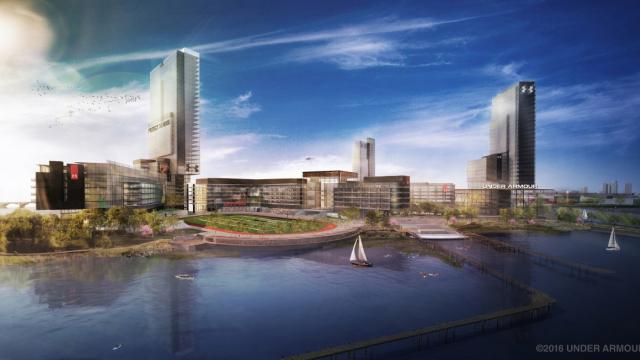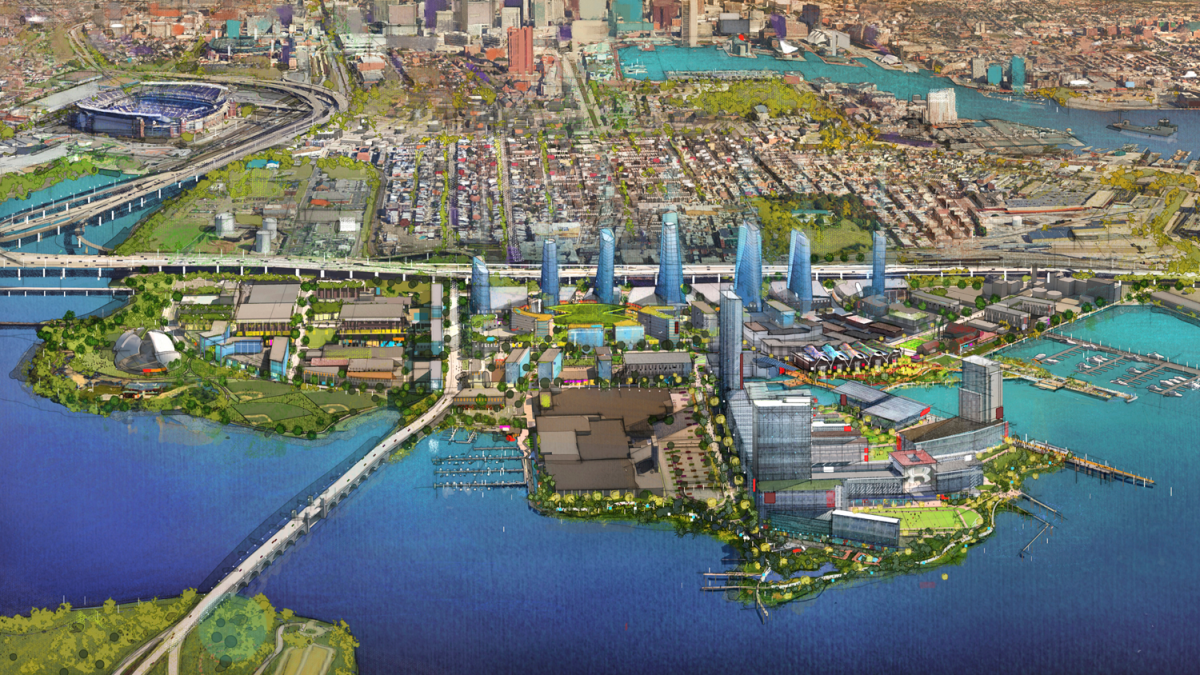
The entire city of Baltimore seemed to be cheering on Michael Phelps as he won his latest set of Olympic medals, continuing his reign as the most decorated Olympian of all time. No one can mistake Baltimore’s pride in our hometown hero. At the entrance to the city on Interstate 95, a giant billboard image of Phelps welcomes one and all.
That image is an advertisement for Under Armour, a brand almost as synonymous with Baltimore as our star swimmer. The major difference between the two? These days, Under Armour and its founder Kevin Plank are getting jeers from once loyal fans.
Why are Under Armour and Plank in such hot water? Sagamore Development Corporation, a company owned by Plank, is planning to revitalize a 260-acre stretch of former industrial land along Baltimore’s Inner Harbor into an exclusive “city within a city” that would house an expanded Under Armour campus. Plank’s one request to the city of Baltimore: To complete this massive Port Covington project, he’s asking for $535 million in “tax increment financing.”
If Plank gets these “TIFs” – a combination of upfront city bond payments and deferred property tax liability – his master plan wouldn’t add any new revenues to Baltimore’s tax base for another 40 years. On top of that, the Sagamore Development Corporation would be eligible for another $200 million in outright tax breaks.
Plank’s proposal comes with no binding commitment that the Port Covington project would create any affordable housing, hire locally, or promote local business development. What’s worse, his “city within a city,” local critics point out, would also put extra stress on Baltimore’s already underfunded schools, likely be inaccessible to current residents, and further segregate a Baltimore already deeply divided racially and economically.
Over recent years, Baltimore’s City Council has been greenlighting larger and larger TIF agreements and developer subsidies that have provided little if any public benefit. Observers expect the Council to approve the Port Covington plan early this fall, less than five months after its public unveiling.
Cities across the country have turned to similar TIF agreements and tax subsidies to attract big businesses and revitalize their urban cores. But studies and past experience have shown that these agreements do not serve the public interest. Plans like Plank’s have elsewhere generated few if any living-wage jobs for current residents and failed to create any appreciable wealth that trickles back into local communities.
Under Armour has built a compelling national identity around its Baltimore roots. Yet today the company operates just like any other multinational corporation. Baltimore has a skilled, experienced, and jobless industrial labor force. Yet all of Under Armour’s plants are located overseas, and no one at the company plans to move any of those jobs to its new Port Covington headquarters.
In his public outreach, Kevin Plank continues to claim that Under Armour remains committed long-term to Baltimore and the Port Covington project. His handshake agreements, vague promises, and hollow slogan, “We will build it together,” have enticed a few city residents.
But at a recent public hearing, Sagamore Development Corporation vice president, Caroline Paff, revealed Under Armour’s true colors on their future expansion.
“Development will happen here,” she not-so-subtly threatened, “or it will happen elsewhere.”
This sort of corporate strong-arming has become all too familiar in our modern age. Our contemporary urban development pits cities against one another, all to the benefit of a private corporate elite.
Instead of throwing our support behind large corporations that hold our cities hostage for subsidies and pledge allegiance only to shareholder bottom lines, we need to be investing in new sorts of participatory, community-driven development that circulates wealth back more widely throughout the local economy. And, in fact, Baltimore could learn some useful lessons from cities doing just that.
Cities elsewhere in the United States are now successfully building prosperity and a healthy tax base by encouraging cooperatively owned businesses and community-controlled housing. These cooperative enterprises are providing job opportunities in blighted communities often deemed too risky by traditional developers. Once up and running, they circulate money back into the local economy.
New York City has created a revolving loan fund that helps support new local businesses and gives them the tools they need to incorporate as worker-owned cooperatives. This fledgling new program has been so successful that the New York City Council has renewed and raised its funding.
Cleveland has developed what’s called an “anchor-institution strategy” that’s particularly relevant to Baltimore, a city with strong higher ed institutions – like Johns Hopkins and the University of Maryland – committed to making an impact in their communities. Cleveland’s Evergreen Cooperative took root when local hospitals and universities agreed to help catalyze new industry and purchase – on an ongoing basis – products and services from local cooperative enterprises in their surrounding neighborhoods.
This commitment by Cleveland’s anchor institutions has won national acclaim and created stable, living-wage jobs in green industries for residents of deeply poor communities.
In Boston, the Dudley Street Neighborhood Initiative has transformed one of the city’s most blighted neighborhoods into a vibrant, stable, and active community with permanent affordable housing and services. The Baltimore Housing Roundtable’s 20/20 Vision is already working with communities throughout the city to adapt Dudley Street’s community land trust model.
Our cities are facing a crisis. We can continue business as usual and allow development to drive out current residents and make our cities accessible only to the most affluent. Or we can chart a new path of inclusive development that creates vibrant and sustainable urban spaces.
Are you listening, Baltimore City Council?
3 WAYS TO SHOW YOUR SUPPORT
- Log in to post comments












